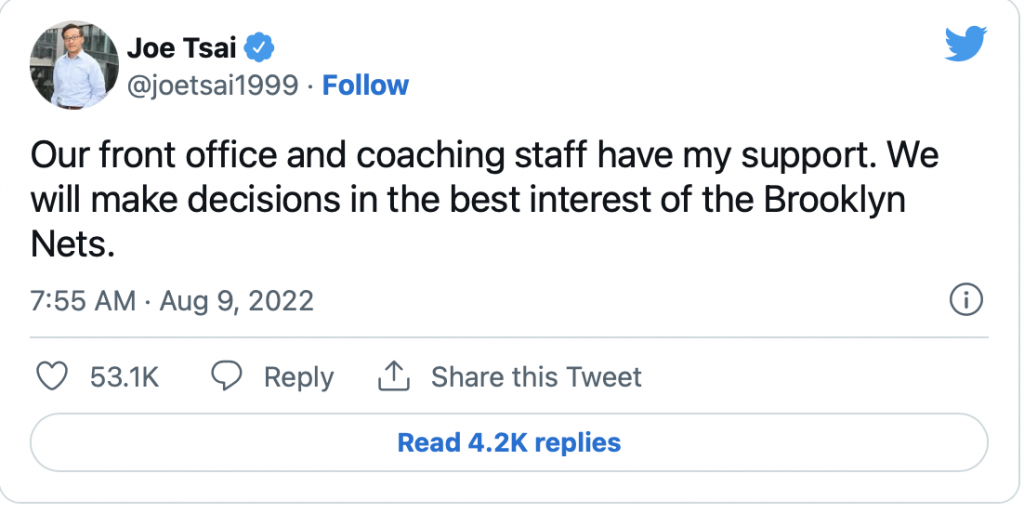Imagine for a moment that you own an NBA franchise. Demanding a trade is your most valued player. You finally have a face-to-face meeting with him, and he gives you an ultimatum: Fire the coach and my boss (the general manager), or I'll go.
According to reports, Brooklyn Nets owner Joe Tsai recently encountered this problem. ESPN and The Athletic have reported that NBA star Kevin Durant, the franchise's finest player, is forcing the team to pick between him, head coach Steve Nash, and general manager Sean Marks. According to sources at Athletic, Durant “said he doesn't have faith in the team's direction.”
Of course, without being there, it's impossible to know exactly how that dialogue unfolded. However, perception shapes reality, thus a leaked report calls for a reaction of some kind. How would you respond?
Tsai gave one tweet as a response.

“I'm behind our coaching staff and front office. We'll make choices that are best for the Brooklyn Nets.”
Tsai's tweet demonstrates emotional intelligence, or the capacity to recognise and control emotions, in a masterful way. Let's examine what makes this tweet so outstanding and what leaders and business owners throughout the world may learn from it.
How to improve company culture
Let's examine the Nets owner's predicament carefully before discussing Tsai's brilliant remark.
The dismissal of Nash and Marks will not benefit the Nets in any way. Durant may make a similar demand in a year or perhaps a few months, even if they replaced both. Not to mention that Nash and Marks have both had successful careers while working for the Nets organisation and have always been great professionals.
What type of culture would be established if Tsai fired Nash and Marks in order to placate his superstar?
According to research, workers perform best in an atmosphere that fosters psychological safety—a fancy word for what is essentially trust. Tsai would put the interests and desires of a single person before what is best for the team if he fired his front office. A terrible precedent would be created, deterring any future coaches, general managers, or even teammates from criticising Durant, even when he is in error, for fear of losing their jobs.
We now come to Tsai's tweet.
Tsai shown his support for his community while media reports abounded and fans and rivals alike speculated about the Nets' response. He affirms his dedication to his coach and front office, demonstrating that no player is superior to the team's culture.
Tsai's remark does not blame Durant, which is another important aspect.
Tsai is aware that emotions and feelings fluctuate. Meaning that, with proper management, relationships can mend and the company may still be able to collaborate with its current personnel and perhaps even achieve great things.
Tsai is aware that the Nets are in charge and hence have the advantage despite Durant's desire to leave Brooklyn.

